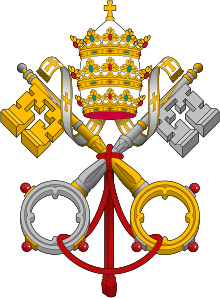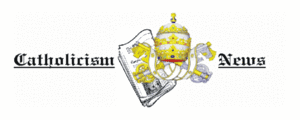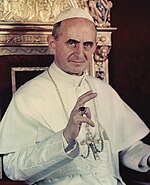Portal:Catholic Church
Introduction The Catholic Church, also known as the Roman Catholic Church, is the largest Christian church, with 1.39 billion baptized Catholics worldwide as of 2022. It is among the world's oldest and largest international institutions, and has played a prominent role in the history and development of Western civilization. The church consists of 24 sui iuris churches, including the Latin Church and 23 Eastern Catholic Churches, which comprise almost 3,500 dioceses and eparchies located around the world. The pope, who is the bishop of Rome, is the chief pastor of the church. The Diocese of Rome, known as the Holy See, is the central governing authority of the church. The administrative body of the Holy See, the Roman Curia, has its principal offices in Vatican City, a small independent city-state and enclave within the Italian capital city of Rome, of which the pope is head of state. The core beliefs of Catholicism are found in the Nicene Creed. The Catholic Church teaches that it is the one, holy, catholic and apostolic church founded by Jesus Christ in his Great Commission, that its bishops are the successors of Christ's apostles, and that the pope is the successor to Saint Peter, upon whom primacy was conferred by Jesus Christ. It maintains that it practises the original Christian faith taught by the apostles, preserving the faith infallibly through scripture and sacred tradition as authentically interpreted through the magisterium of the church. The Roman Rite and others of the Latin Church, the Eastern Catholic liturgies, and institutes such as mendicant orders, enclosed monastic orders and third orders reflect a variety of theological and spiritual emphases in the church. Of its seven sacraments, the Eucharist is the principal one, celebrated liturgically in the Mass. The church teaches that through consecration by a priest, the sacrificial bread and wine become the body and blood of Christ. The Virgin Mary is venerated as the Perpetual Virgin, Mother of God, and Queen of Heaven; she is honoured in dogmas and devotions. Catholic social teaching emphasizes voluntary support for the sick, the poor, and the afflicted through the corporal and spiritual works of mercy. The Catholic Church operates tens of thousands of Catholic schools, universities and colleges, hospitals, and orphanages around the world, and is the largest non-government provider of education and health care in the world. Among its other social services are numerous charitable and humanitarian organizations. (Full article...) Selected article
 Vix Pervenit: On Usury and Other Dishonest Profit was an encyclical, promulgated by Pope Benedict XIV on November 1, 1745, which condemned the practice of charging interest on loans as usury. Because the encyclical was addressed to the Bishops of Italy, it is generally not considered ex cathedra. The Holy Office applied the encyclical to the whole of the Roman Catholic Church on July 29, 1836, during the reign of Pope Gregory XVI. The encyclical codified Church teachings which date back to early ecumenical councils, at a time when scholastic philosophy (which did not regard money as a productive input) was increasingly coming into conflict with capitalism. Though never formally retracted, the encyclical's relevance has faded as the Church retreated from actively enforcing its social teachings in the financial sphere, and as the practice of charging interest on loans became almost universally accepted—legally and ethically.
Selected image
 The chapel of the Palace of Versailles, one of the palace's grandest interiors. Located in Versailles, France, Versailles is famous not only as a building, but as a symbol of the system of absolute monarchy which Louis XIV espoused. Originally the royal hunting lodge when he decided to move there in 1660, the building was expanded over the next few decades to become the largest palace in Europe. Louis XIV officially moved in 1682 and the Court of Versailles was the centre of power in Ancien Régime France until the royal family was forced to return to the capital in 1789. Selected biography
Joseph Havens Richards SJ (born Havens Cowles Richards; November 8, 1851 – June 9, 1923) was an American Catholic priest and Jesuit who became a prominent president of Georgetown University, where he instituted major reforms and significantly enhanced the quality and stature of the university. Richards was born to a prominent Ohio family; his father was an Episcopal priest who controversially converted to Catholicism and had the infant Richards secretly baptized as a Catholic. Richards became the president of Georgetown University in 1888 and undertook significant construction, such as the completion of Healy Hall, which included work on Gaston Hall and Riggs Library, and the building of Dahlgren Chapel. Richards sought to transform Georgetown into a modern, comprehensive university. To that end, he bolstered the graduate programs, expanded the School of Medicine and Law School, established the Georgetown University Hospital, improved the astronomical observatory, and recruited prominent faculty. He also navigated tensions with the newly established Catholic University of America, which was located in the same city. Richards fought anti-Catholic discrimination by Ivy League universities, resulting in Harvard Law School admitting graduates of some Jesuit universities. Upon the end of his term in 1898, Richards engaged in pastoral work attached to Jesuit educational institutions throughout the northeastern United States. He became the president of Regis High School and the Loyola School in New York City in 1915, and he was then made superior of the Jesuit retreat center on Manresa Island in Connecticut. Richards died at the College of the Holy Cross in 1923. (Full article...) Did you know...

Related portalsFeast Day of May 29
Selected quote

News
SubcategoriesTopics
The Holy Bible:
Particular Churches (grouped by liturgical rite):
Things you can do
External resourcesWikiProjectsAssociated WikimediaThe following Wikimedia Foundation sister projects provide more on this subject:
Discover Wikipedia using portals |


































